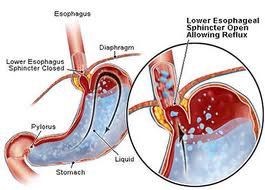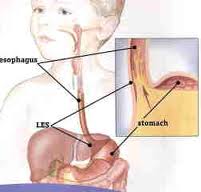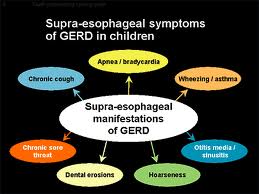GERD is not an uncommon disorder amongst infants but this diagnosis is frequently missed out due to the fact that spitting up after a meal is a common occurrence in children. However, this is a difference between spitting up after a meal and the symptoms of GERD. If the parents are able to observe that their infant possibly has symptoms that are not normal, they will seek treatment well in time.

GERD causes upward movement of the contents of the stomach (food+acid) into the food-pipe (esophagus) of the child, sometimes into or out of the mouth.
Causes of GERD in children:
A poorly coordinated gastro-intestinal tract is the commonest cause of GERD in children. An immature digestive system is the prime reason for this complaints and this is precisely why most of the infants outgrow this condition by the time they complete 1 year of age.
The causes of GERD in older children are predominantly the same as the causes of GERD in adults.
Certain other factors that may contribute to GERD include obesity, overfeeding, certain medications, etc. There also appears to be an inherited component to GERD, as it is more common in some families than in others.
Symptoms of GERD in children:
The common symptoms of GERD in children are as follows:
- Recurrent vomiting
- Frequent or persistent cough
- Refusing feeds or notable difficulty in eating
- Choking or gagging during feeds
- Older children may complain of heartburn, abdominal pain, gas
- Infants may demonstrate colicky behavior (frequent crying and fussiness).
- Regurgitation and re-swallowing
- Severe cases may lead to any of the following in the long run:
- Poor growth
- Breathing problems
- Recurrent pneumonia
Treatment of GERD in children:
Most babies outgrow GERD by the time they complete one year of age. However, even during this period, proper treatment must be administered to ensure that the complaints do not worsen. However, certain additional life-style changes are suggested for infants for better control of the symptoms:
- Elevate the head end of the baby’s crib
- Hold the baby upright for at least 30 minutes after a feed.
- Burp feeding on each side.
- Try several short feeds frequently rather than one large feed
- With the approval of your doctor, introduce semi-solid foods into the diet of your infant
- Avoid over-feeding the child at any time
- Older children should not be allowed to lie down for at least 2 hours after meals
- Limit foods that you think worsen your child’s complaints





